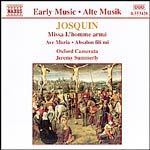
Desprez: Missa L'homme arme / etc
 $25.00
Low Stock
add to cart
$25.00
Low Stock
add to cart
JOSQUIN DESPREZ
Desprez: Missa L'homme arme / etc
Oxford Camerata / Jeremy Summerly (conductor)
[ Naxos / CD ]
Release Date: Sunday 11 November 2001
Should this item be out of stock at the time of your order, we would expect to be able to supply it to you within 2 - 5 business days.
"What a beautiful Mass it is; very beautifully sung and recorded here. With full texts provided, this CD is one of the very finest of this distinguished Naxos series."
- Rosette (Highest Rating) Penguin Stereo Guide
"I know I'll return tothis disc the next time I want to hear Mass"
- Fanfare
Little is known of the early years of Josquin Desprez, until a singer with the name Josquin appears in the records of the Milan Cathedral for 1459. He was probably born in France, but he, or his family, appear to have moved to Italy seeking work. Josquin certainly had a high degree of eminence, as we find him working as a musician in the papal chapel, and this makes the reason for his return to France all the more strange and unclear. Indeed there are some who believe there were two composers called Josquin. Certainly it was in France that he wrote the major works that we know from the beginning of the 16th century. But the theory that there were two Josquins falls apart when we find this Josquin again in Italy later in life, and it is the mixture of the two cultures that gave his music a distinct style. He must have written a considerable amount, since so much has survived, and he has been regarded as the finest composer in the early part of the 16th century. It is almost entirely vocal music, both secular and sacred, and though his masses were outstanding, he will be best remembered for taking motets to an elevated level of excellence.
Where and what he wrote is an argument that still provide scholars with much to deliberate. Why is there just one work, the Ave Maria which opens this disc, written before 1485 when his known output began? If the reasonable guess of his birth date as being 1440, that would place the Ave Maria in his thirty-sixth year. Though a work of some stature, it is hardly a masterpiece from a highly acclaimed composer. Was he born much later and that Josquin in Milan is, after all, another person? The Missa L'homme armé probably dates from the late 1490's and forms part of a number of Masses he composed around that time. It is in five sections, into which the conductor has introduced the Laeta Dies. The Credo is a well worked section of considerable length for that period, but the remaining parts of the Mass are of an uneventful nature, which is making modern musicologists reexamine Josquin's apparently high ranking in the musical world in the early part of the 16th century.
The booklet accompanying the disc details modern thoughts as to the origin of Absalon fili mi. Whatever its inception, it is a particularly beautiful and serene lament, that would fit a date from the end of the 16th century.
The disc ends with the Lament on the death of Josquin by Jheronimus Vinders, a composer born in Flanders of whom nothing is known. Whether he even knew Josquin we do not know, but the composition is one of deep compassion.
Founded in 1984 in order to meet the growing demand for groups specialising in the performance of music from the Renaissance era, Oxford Camerata signed a long-term contract in 1991 to record for Naxos. They have now placed on disc the setting of L'Homme armé by Dufay, Obrecht and Josquin. With its conductor, Jeremy Summerly, it has made over 30 CDs spanning nine centuries. In addition to performing and broadcasting in the UK, the Camerata has appeared throughout Europe, and in 1995 was awarded the European Cultural Prize. Classic CD magazine comments "they sing like angels"
Having graduated from Oxford University in 1982, Jeremy Summerly worked over the next seven years as a Studio Manager for BBC Radio in London. He founded the Oxford Camerata, and in 1990 he was appointed conductor of the Schola Cantorum of Oxford, an appointment he held for six years. In 1995 he became one of the major writers and presenters for BBC Radio 3, and in 1996 was appointed Head of Academic Studies at the Royal Academy of Music in London. For Naxos has made a number of first recorded performances with the Oxford Camerata, and Classic CD magazine has described his work as "a triumph for the collaboration of scholarship, performing insights and brilliant production".
Tracks:
Ave Maria
01. Ave Maria 05:39
Missa L'homme arme
02. L'homme arme 00:42
03. Kyrie 04:27
04. Gloria 07:35
05. Credo 10:41
06. Laeta Dies 02:26
07. Sanctus 06:17
08. Agnus Dei 09:16
Absalon, fili mi
09. Absalon fili mi 04:32
Lament on the death of Josquin (Vinders)
10. Lament On The Death Of Josquin 04:24



